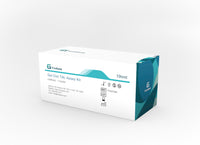
本身
html
Limulus Amebocyte Lysate (LAL) Reagents for Endotoxin Detection
Endotoxins, also known as lipopolysaccharides (LPS), are harmful substances found in the outer membrane of Gram-negative bacteria. Their presence in pharmaceuticals, medical devices, or other sterile products can lead to severe health risks, including fever, septic shock, and even death. To ensure safety, the detection and quantification of endotoxins are critical in the pharmaceutical and medical industries. One of the most reliable methods for this purpose is the use of Limulus Amebocyte Lysate (LAL) reagents.
What Are LAL Reagents?
LAL reagents are derived from the blood cells (amebocytes) of the horseshoe crab (Limulus polyphemus). These reagents react with bacterial endotoxins, forming a gel or producing a color change, depending on the test method used. The LAL test is highly sensitive and specific, making it the gold standard for endotoxin detection in various applications.
Types of LAL Reagents
There are three primary types of LAL reagents used for endotoxin testing:
- Gel-Clot LAL: This is the simplest and oldest form of the test. It detects endotoxins by forming a gel clot in the presence of LPS. The test provides a qualitative or semi-quantitative result.
- Chromogenic LAL: This method uses a synthetic chromogenic substrate that releases a yellow color when cleaved by an enzyme activated by endotoxins. The intensity of the color is measured spectrophotometrically to quantify endotoxin levels.
- Turbidimetric LAL: In this method, the formation of turbidity (cloudiness) due to endotoxin-induced clotting is measured over time. The rate of turbidity increase is proportional to the endotoxin concentration.
Applications of LAL Reagents
LAL reagents are widely used in various industries, including:
Keyword: LAL Reagents for Endotoxin Testing
- Pharmaceuticals: Ensuring injectable drugs, vaccines, and medical devices are free from endotoxins.
- Biotechnology: Testing recombinant proteins, cell therapies, and other biologics.
- Medical Devices: Validating the sterility of implants, catheters, and surgical instruments.
- Water Testing: Detecting endotoxins in dialysis water and other critical water sources.
Advantages of LAL Testing
The LAL test offers several benefits over other endotoxin detection methods:
- High Sensitivity: Capable of detecting endotoxins at very low concentrations (as low as 0.001 EU/mL).
- Rapid Results: Provides quick and reliable outcomes, often within 60 minutes.
- Regulatory Compliance: Approved by major regulatory agencies, including the FDA, USP, and EP.
- Versatility: Suitable for a wide range of sample types, including liquids, solids, and gases.
Conclusion
Limulus Amebocyte Lysate (LAL) reagents are indispensable tools for endotoxin detection in critical industries. Their high sensitivity, reliability, and regulatory acceptance make them the preferred choice for ensuring product safety. Whether you’re in pharmaceuticals